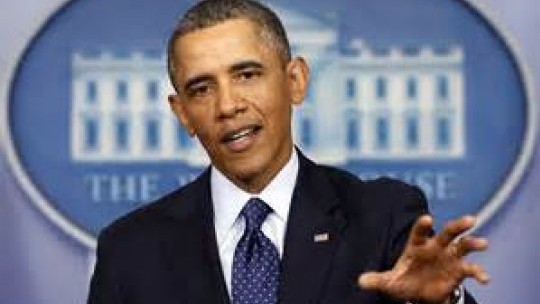“The Man” Barry – part 1
10:50 pm, Sat March 28, 2015
By Bumpy Walker
If I was the prezident of the United States
I’d live on lotsa candy
And swing on all the gates…
The above rhyme is a childish view that President of the United States (POTUS) leads without censure and lives without oversight is from the 1964 novel “The Man”. (1) The plot of this page turner by Irvine Wallace is the President and Vice President of the United States both die suddenly; thereupon Douglass Dilman, the Senate President pro-tempore, becames POTUS. The twist was Douglass Dilman was an African American.
In “The Man” President Dilman is assailed on all sides: by the press, by community activist, by his own party, by the Party Opposite for the behaviour of family, alleged unproven sexual impropriety, but principally incompetence. The cause was this was simple an undeniable open racism. An attempt is made to impeach him, much in the style of former President Johnson of the 1860’s. Dilman is saved because his strongest critic - a Strom Thurmond-like figure - in true cinematic fashion, does an about face and votes against the President’s impeachment because of his competency.
Currently, POTUS is a self-confessed, Guinness drinking, American of Irish descent (Barry O’bama) (2) like the fictional President Dilman happens to be African American. Like the fictional character he is derided by sections of the press, a lunatic fringe of conspiracy activists, community activists, the Tea Party, both houses of Congress, with snubs and personal vitriolic verbal assaults. In spite of this, Barry has competently guided the United States through the past six years; yet he seems unable to gain the respect of the opposing Party.
Unlike the fictional Dilman, he is not being judged by his performance. There seems to be a constant battle by Republicans, whose comic opera behaviour belittles both the prestige of the office and the brand of their own country. This is unfortunate, as through his speeches and presence, Barry has done a lot to ameliorate the perception of the United States as a modern day Roman Empire and diffuse the image of the ugly culturally insensitive American.
Like Irvine Wallace, four decades ago, the current Republican elected officials in both houses of Congress and a significant part of the US “anglo” population cannot accept that a man with Barry’s considerable African DNA could, by his own merit, be possibly competent to win elections and lead the United States.
It is impossible to ignore US domestic and foreign policy. It has the largest economy, the greatest military capability, the most accessible culture, largest market, and the most powerful brands. How its leadership performs has an impact on every single country in the world. The Obama administration has performed well.
POTUS Vs the Republican Houses
The American political system, through its constitution, is designed to prevent abuse of power by the government, with each separate branch deliberately having oversight over the others; a system designed with inherent check and balances, that while trusting the vision of human creativity, is distrusted rule by personality. Currently the executive - the presidency - is in the hands of the Democratic Party. Since the mid-term elections, the Republican Party has a majority in both houses of Congress. Normal legislative process has thus descended into political gridlock. It seems that, with this President, the houses of Congress have deliberately set out to stymie our real life Dilman, much more than can be associated with every day politics.
To break this log jam, POTUS came out fighting politically, by-passing the law making chambers and appealing directly to the voters, much as President Reagan did during his administration. In his January state of the Union address Barry, with the zeal of a charismatic Episcopal preacher, made an appeal to the better nature of his constituency. His passionate, reasoned appeal was deemed to be a success. It seems to have left the Republican legislators marginalized, despite having the whip hand in the check and balance system that is the United States government.
The Republican Party, which has branded itself as the party of “traditional Christian” family values (as well as the party of business) seems to have forgotten that traditional family values include politeness and respect for all its members. Thus, in contradiction to their brand of conservative traditionalism, the Republican Party broke with accepted protocol and invited the leader of government of another sovereign state, Israel to address a joint session of both elected houses without consulting the head of state PROTUS.
Given that there are currently tensions with the long alliance with Israel, this was hardly politic. If snubbing the President domestically is not enough, 47 Republican Senators then send an open letter to leadership of Iran, attempting to undermine the authority of their own Head of State. This is done while the administration is in delicate negotiations with the Islamic Republic. This led to the Iranian Foreign Minister giving the US Senators a lesson in basic international law and United States civics.
Energy Policy Bonanza
A decade ago the idea of an energy independent United States was not even a pipe dream. Yet now experts are expressing the idea that the United States will regain energy independence before 2020. The fracking / horizontal drilling shale revolutions has proven that it may be an attainable goal. Under Obama, hydrocarbon consumption has actually fallen, complemented by a rise in locally produced supplies. Currently the US is not energy independent, but its dependence on outside energy sources has been dwindling year on year. The consumption/ production of hydrocarbon ratio in the NAFTA trading zone (Mexico, Canada and US) there has been a steady falling to closer to parity on an annual basis.
It should be highlighted that it is disingenuous to give credit for this change to Obama and his administration nor to his predecessor, President Bush. Both administrations had stated ambition was to regain energy independence through conservation, alternatives and undefined blue sky research. Obama at best has been ambivalent about fracking. The credit for this achievement lies with risk taking Energy Barons such as the second generation immigrant George Mitchell of Mitchell Energy and the reality TV ready Hamm of Continental Resources. (3)
The impact of this change in locally produced energy has had significant impact on both the US economy and its foreign policy.
The Economy
At the moment the US economy is not merely showing green shoots of recovery but actually flying. Job creation is up in the last quarter. GDP is rising. More interestingly there has been a reversing of the trend over the last two decades of jobs migrating from the US to Mexico and the tiger economies of Asia. This is now doubt driven by lower energy costs, lower transport costs, and a motivated workforce.
Foreign policy of the Obama
Middle East – US relationship is fascinating to an observer. There are multiple layers, counter currents that are at the same time laden with contradictions. There are far too many complex relationships in that region to be covered here. However one of the bedrocks of US foreign policy has been, since the 1930’s, its support for Saudi Arabia. It made sense post World War II, given that the US stopped being an energy exporter to an energy importer, thus securing supply.
The father of the British traitor Philby, encouraged the Saudis to look to the US to explore for oil, not to the his own countrymen who were not only in control of the Persian oil industry next door, but also had colonies / protectorates in Trucial - Oman States (United Arab Emirates and Oman).
Standard Oil, with the compliance of the State Department, created the Saudi hydrocarbon industry, albeit at the expense of the British who arrogantly treated the Saudis like second class subjects rather than with the more nuanced approach taken by Roosevelt, the US President.
In the 50’s, with the decline of British military capability, the US stepped in and replaced them, sucking Iran into its sphere of influence. This brief diluting of the US -Saudi interdependence ended with the disposal of the Shah by the Shia led Islamic revolution; the US influence waned on the east of the Gulf, allowing the Saudis to regain lost influence. It got to the point that the Saudi Ambassador to the US, Prince Bandar, became known as Bandar Bush (3).
Barry’s administration can see a future without any dependence on Middle Eastern oil. The FRACKING revolution has, as previously mentioned, given the US near energy independence. With additional energy sources in Africa and off Brazil available, it could allow the US administration to cut loose from the anarchic Saudi regime. And confront perceived Russian Hegemony.
Indeed, the lowering of the cost of energy by the excess hydrocarbon production has weakened Russian economic power as well forced the Iranians to be more conciliatory, given both economies need US$120 per barrel oil to be balanced.
The fact of the matter is that, less than 20 years ago, the then Republican President, George H.W.Bush attempted to disengage from the conflicts of the Middle East with disastrous consequences. It could be argued that the intelligence failures that led to the incidents of 9-11 were in part due to this disengagement. This demonstrates the need for the US to actively engage with this region’s protagonists, much as Barry has been.
In Part Two, we’ll look at some issues closer to home, including those involving Cuba and Venezuela.
Bumpy Walker, an engineer by training, is a Jamaican based in Europe

8:37 pm, Sat May 31, 2025

8:34 pm, Sat May 31, 2025

8:30 pm, Sat May 31, 2025








 All feeds
All feeds







